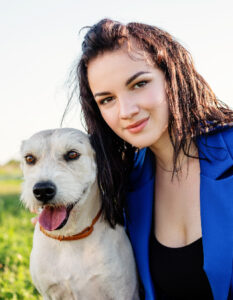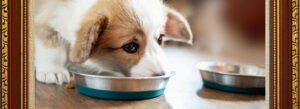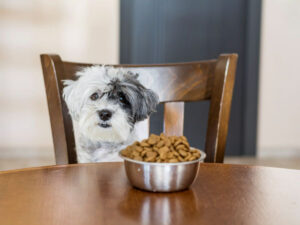Is your puppy acting lethargic and weak? If yes then it’s time to check their stool consistency, in case they have diarrhea. Puppy diarrhea is the ultimate horror you can encounter as a puppy parent.
Our little puppies are often stricken with diarrhea, which refers to loose or watery stool discharge in puppies. Our little puppies can feel uncomfortable, weak, and unsettled.
This can lead to dehydration, malnutrition, and even death in many cases. Moreover, our puppies are in a lot of pain while suffering from puppy diarrhea. Use needs to be aware of the signs, symptoms, treatment, and prevention of puppy diarrhea.
Therefore, as a veterinarian, I have outlined the causes, treatment, and prevention of puppy diarrhea.
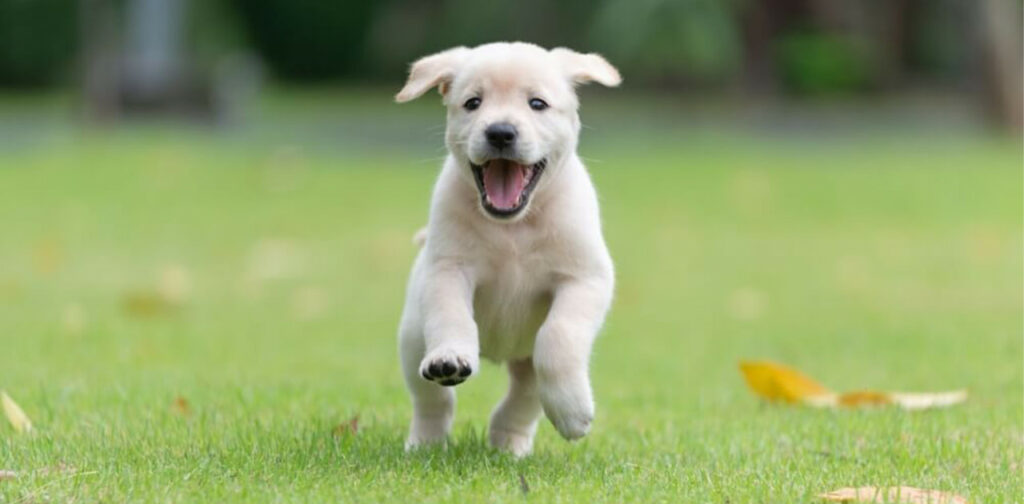
Causes of Puppy Diarrhea
Puppies are active little beings roaming around everywhere and chewing, liking, and biting on everything. Puppies are yet to receive much behavioral management training to be aware of what in their environment is good or bad.
This opens up them to a larger threat of puppy diarrhea. Some key causes of puppy diarrhea are:
- Dietary changes, while changing between food brands or food types.
- A new type or brand of puppy food may contain properties that can trigger food allergies in your little friend.
- Contact with parasites, and viral or bacterial infections can cause puppy diarrhea.
- Separation, a new environment, loud noises, and unfamiliar people can trigger stress and anxiety in your pup.
- Your puppy may also have some underlying physical condition that may cause them puppy diarrhea.
Recognizing the Symptoms of Puppy Diarrhea
If you suspect your puppy has puppy diarrhea look for the signs and symptoms below:
- Unusual Stool Consistency and Behavior: Your little friend may have to defecate frequently and show urgency for defecating. The stool consistency is loose or watery. Your puppy regardless of being potty trained may end up with accidents or an inability to control bowel movements indoors.
You may notice blood or mucus in the stool and foul-smelling stool. It is important to keep an eye on the stool of your puppy regularly. - Lethargy or weakness: Your puppy may not act as playful as before. They may also show less interest in going outdoors. You may also see them vomiting or acting nauseated. Abdominal discomfort and bloating are also common signs of puppy diarrhea.
- Loss of appetite: During puppy diarrhea, your puppy may not want to eat and drink as per their regular consumption habit
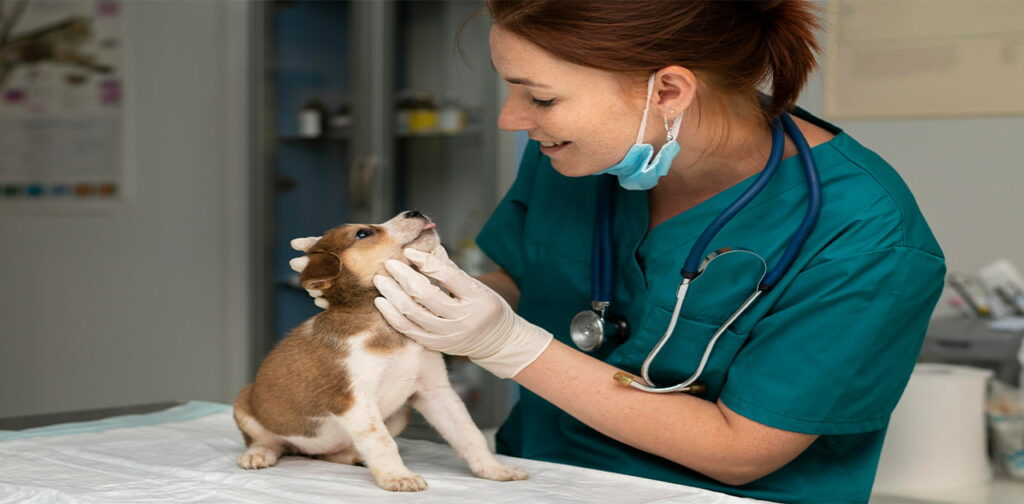
When to Seek Veterinary Care
Experienced puppy parents are often able to handle and treat mild puppy diarrhea by themselves. But for new puppy parents, it is important to communicate and consult with the veterinarian immediately after spotting any signs or symptoms of puppy diarrhea.
However, even experienced puppy parents must seek immediate veterinary attention in case their puppy has been gripped by diarrhea for more than 24 hours and exhibiting signs like constant vomiting, crying in pain, weakness, and refusal of food and water.
As such symptoms can accelerate towards severe damage to your pup’s heath. You must follow veterinary advice to avoid complications. Probiotics or prescribed meds may be needed, but avoid self-medicating with over-the-counter drugs.
Consulting with a Veterinarian
As soon as you realize the urgency for veterinary attention, you need to find an available vet in your area. It is smart to consult with someone close to home. This offers an emergency communication advantage.
This timely veterinary intervention can prevent dehydration, malnutrition, and other complications associated with diarrhea.
While consulting with your vet provide details on diarrhea frequency, consistency, recent diet changes, and other relevant factors in your observation. It is important that you ensure clear and effective communication for the efficiency of care.
Based on the provided information your vet can offer professional guidance and observation to ensure your puppy’s wellbeing.
Veterinarians can also develop personalized treatment plans based on the puppy’s specific needs and the underlying cause of diarrhea, resulting in a faster recovery process, and promoting the puppy’s overall health and well-being.
When to Adjust Your Puppy’s Diet
Puppy diarrhea could result from various factors such as food allergies, dietary indiscretion, or intestinal parasites. Whenever you notice symptoms like lethargy or vomiting, it’s crucial to consult a veterinarian for proper diagnosis and dietary recommendations. Your vet may suggest you adjust your puppy’s diet.
A balanced homemade diet under veterinary guidance can meet your puppy’s specific nutritional needs. Homemade diets should include lean protein sources, carbohydrates, healthy fats, and essential vitamins and minerals.
Make sure to always monitor your puppy’s response to dietary changes and adjust as needed under the guidance of a veterinarian to ensure their health and well-being.
High-quality commercial puppy food provides balanced nutrition essential for your puppy’s growth and development. It’s important to transition gradually to a new diet to avoid further digestive upset.
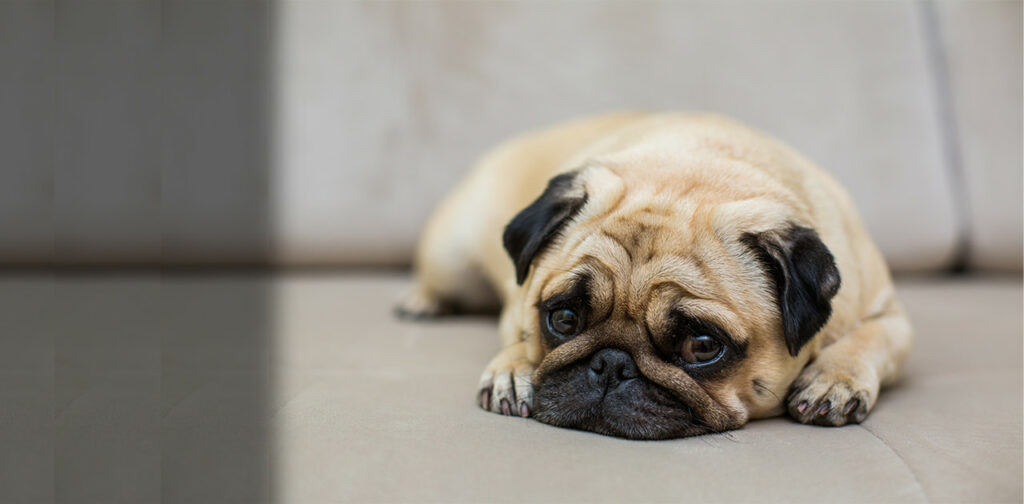
Treating Puppy Diarrhea
Let’s discuss how you can treat mild puppy diarrhea at home with fasting, bland diets, and hydration.
Step 1: Fasting
Fasting can help in rest and recover your puppy’s digestive system from irritation. A break can give the intestines time to heal and reduce the frequency of bowel movements. This fasting period should not be more than 12 to 24 hours.
Stop feeding and comfort your pup with love and care. Give them extra attention and care during the fasting period.
Step 2: Bland diets
As soon as your puppy is over the fasting period, feed them bland food to avoid any digestive irritation. I would recommend some boiled chicken and rice as they are gentle in the stomach.
Do not add seasoning or typical pet food as the formula can get complex resulting in repetition of gastral problems. Give them frequent meals in smaller portions.
Step 3: Hydration
Hydration during diarrhea is essential for any species as diarrhea causes a lot of water loss from the body. This causes puppies to have dehydration and, in some cases, puppies die due to dehydration.
As you can understand the severe importance of hydration it is important to keep your puppy hydrated with plenty of water. If your puppy refuses to drink water try to help them drink water through a syringe.
This approach should not look or feel forceful rather ensure you are comforting your puppy during the process.

Preventing Puppy Diarrhea
We vegetarians always say prevention is better than cure. And in the case of a puppy’s health, it becomes indispensable due to their delicate nature.
Your puppy is still developing their immune system Therefore is not able to fight all the diseases by themselves. Especially puppy diarrhea as they are very prone to it.
Throughout my 7 years of experience, I have seen puppy parents preventing puppy diarrhea using only 4 steps. Have a quick look and implement them by yourself to keep your puppy friend safe and sound.
Step 1: Gradual diet changes
As a vet I often see puppies suffering from diarrhea due to a sudden dietary change. Our little puppies do not have a quite developed digestive system. This makes them delicate and easily reactive to such changes.
However, for many reasons, you may need to make dietary changes no matter what. The key is to make the transition gradually. Little by little using a mixing technique you can shift your puppy to a new diet plan.
Step 2: Balanced diet
Puppies do have very different nutrient requirements due to their high energy needs. This requirement can also vary among different sizes and breeds of puppies.
Therefore, it is important to feed them a balanced diet that will not upset their digestive system or cause other complications. As a puppy parent, you can educate yourself and be mindful of the food labels.
Step 3: Avoiding table scraps
Unfortunately, it is a common practice to feed puppies tablescapes. Although dogs may easily digest such food, puppy stomachs are a little more delicate and require easily digestible foods.
Table scraps are complex human foods. In many cases, even the human digestive system does not react well to these foods. Avoid feeding your little pup table scraps.
Step 4: Maintaining Overall Hygiene
Our puppies live a very active life. With the lack of training and behavioral management, they can easily develop bad habits such as chewing, licking, or biting onto unhygienic objects. These foreign objects can be full of dirt, infectious agents, parasites, etc.
Therefore, you must train your puppy to maintain good hygiene and start behavioral management training immediately. It is also important for you to maintain good hygiene yourself and inside the house as both are part of the environment of your puppy.
Step 5: Managing Stress and Anxiety
Just like humans’ puppies also go through stress and anxiety due to the changes in their environment. Diarrhea is often a physical expression of this stress and anxiety. New environments, loud noises, separation, unfamiliar people, changes in routine, and confinement can cause stress and anxiety in puppies.
You must include regular exercises, mental stimulation, and positive reinforcement training techniques in your puppy’s daily life.Regular play sessions, short walks, puzzle toys, and reward-based training help keep your puppy mentally stimulated, physically active, and well-behaved.
You also need to spend plenty of time with your pup to ensure they feel safe and comfortable in their environment. Building a strong bond and trust between you and your puppy is the key to eliminating stress and anxiety.
Conclusion
As puppy parents, we are always concerned with our little friends’ well-being and happiness. A healthy puppy is a happy puppy. Therefore, we must take preventive measures and immediate action in case of puppy diarrhea.
While mild puppy diarrhea can be cured at home, escalation of the period over 24 hours requires immediate veterinary attention.
We can offer you accurate diagnoses and tailored treatment plans. Always remember, precaution is better than remedy.

